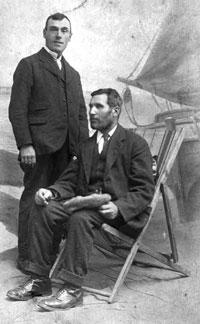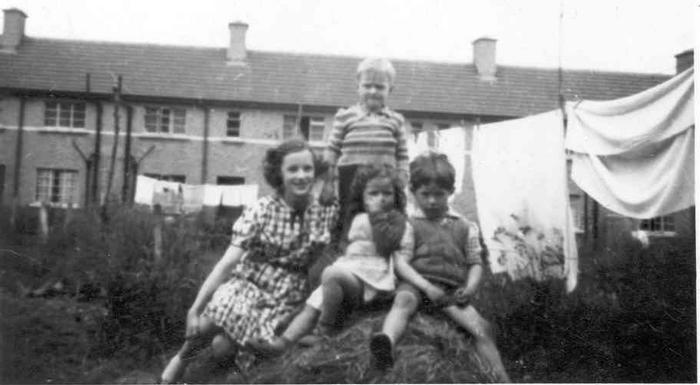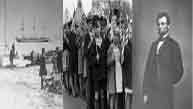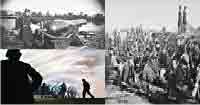|
|
Through Rose-Tinted Specs
Memories of Balbriggan in the 50s
Copyright 2005 By Roger Turner.
Part 2: A Very Different Way of Life
.............
| I wonder how youngsters pass their time in 21st century Balbriggan? My generation would have done anything for what they have nowadays. Eye-Pads, Pm3 Players, Gamestations, CD machines that torture your ears from a hundred yards away, and mobile phones that can do everything but make the tea. This lot of youngsters have it all. But way back in the fifties we had no television to watch, no DVDs and most people didn't even have a record player. But we did have the radio, and even now I could easily do without the TV, but not the radio. It was a different way of life back then when the team from Balbriggan.net consisted of a couple of old fishermen sat on the harbour with a big wooden needle and bale of twine, repairing them.
So, you ask, what did we have back in the 50s?
Well, if you give me a chance I'll tell you. We had; Measles, Chickenpox, Comics, Snakes & Ladders and, in my case, a brand new mouth organ. That's right, a mouth organ. Throughout the year I would save pennies, thrupenny bits, tanners, any money I could lay my hand on to buy a new mouth organ as soon as I got to Balbriggan.
| 
| But why wait until I got to Balbriggan, I hear you ask?
Well, apart from the fact that it had become a ritual, they were imported from Germany and twice the price in Sheffield to what they were in Balbriggan. That meant that for the same money that the basic one would cost in Sheffield, I could buy the top of the range one in, er... oh, now, what did they call the place? You know the shop I mean. It was on Dublin Street somewhere near the old Garda station. You went up two or three steps. Come on memory, don't start letting me down now. What i need is a Gaurdian Angel to help jog me memories.
You know, we spend a lifetime carefully recording data and images, laying them down in some dusty corner of the mind only for the brain to malfunction when the time for retrieval comes round.
And to compound matters, the brain sends you loads of information you didn't ask for, but the brain seems to think you might just make good use of. That's what is happening now, so please bear with me while my brain goes off at a tangent...
| Way way back, almost a century ago, a Scottish born Englishman called William Calow discovered a charming seaside town to the north of Dublin, and fell in love with it and the friendly people who live there. He had red hair, a short red beard and was given the nickname of 'Willie With The Whiskers' by the locals.
'Willie With The Whiskers' was what today would have been called an entrepreneur and although the family business was sweeping chimneys he made a small fortune from selling the soot as fertilizer. For those who don't know, different types of fires produce different qualities of soot.
Willie developed a recipe for mixing furnace soot from the steelworks and factories with household soot, and then selling this product to farms where it was spread on the land to increase crop yields. | 
My Grandfather, standing next to his dad, Willie with the Whiskers. Circa 1912 | But it wasn't soot that brought Willie to Balbriggan, but weaving. Willie, now a moderately a rich businessman, had a business pal who came over to set up a weaving factory, that I seem to think was later called Stevensons. This pal ran the factory for sometime and invited Willie for a holiday and Willie was smitten.
Now we are talking about the years before the First World War when fishing boats were still in sail, and Willie would take a crate of Guinness to the harbour and sweet-talk his way into going out on the fishing boats. Balbriggan drew him back like a magnet and over the years he came over on a regular basis where he made many friends. Willie loved the place so much that he almost bought the hotel in town, but his wife didn't want to come over to live in Balbriggan on a permanent basis (silly woman). | I do believe though that at one time he owned a cottage on Drogheda Street. After the Great War, his son, also called William, but better known as Bill or Stevie (my Grandfather), brought his young wife (Nan) and their daughter (my mother, Eileen) over to discover the charms of Balbriggan for themselves. At first they came across via the steamer to Dublin, but in the early thirties he bought a motorbike with a sidecar and started to come via Stranraer, into Larne in the north and drive down to Balbriggan. | 
| But they didn't just stay in Balbriggan; they would be off touring before they went home.Over the years they became friends with many locals, and my mother became good friends with Eileen Carton. Her father, Jimmy, was head gardener at Hampton in those days. Mother and Eileen became good friends and stayed in touch until mother died in 1980. | 
| Mother went over with Nan and Steve until she married my dad (George) in 1939. Mother and Dad were due to go over that summer, but Hitler had other ideas.During the war our Pat was born and in 1946 or 47 she was taken over by Mother and Dad.This was Dad's first visit to Balbriggan and he too fell in love with the place.
He remembers on his first day in Balbriggan he was instructed to go to the Garda Station to get an emergency ration book. At that time they stayed with the Misses Mangam, just up Skerries Street on the right from the Square. (You know the ones. Houses that stood back from the road, with silver painted railing in front.) When he told the Sergeant where they were staying his attitude changed from a hard-nosed copper, to friend, and although they were only staying a week, he gave them rations for a month. Now that's Balbriggan people to a tee.
I was born in 1948 and came over in my mothers arms a couple of summers later.
Right, that's the history lesson out of the way, now lets get back to the 50s!
| I've given up trying to remember the name of shops, so we'll just call that shop, The Mouth-organ Shop. There, that's one in the eye for my failing memory.
It's over thirty years since I last visited, and even then Balbriggan was changing. Where once we kids innocently trespassed over some farmers field, plans were afoot for posh houses to be built there. But what's new? The house I spent my summers in on Craoibhin Park was itself on a newly built estate.
The one thing that still sticks in my mind is that if you went to call on someone, and they were out, then the key was always in the lock and you just let yourself in and made a pot of tea. | 
| Auntie Eileen's house was no different, and soon after our arrival we would be sat at the kitchen table with hot sweet tea. If we were very lucky, she would have baked some soda bread to enjoy with a little real Irish butter. Gee, I can still taste it, well almost. I once bought Irish soda bread in our local supermarket, and it were rubbish and nowt like the real thing!
When my mother and Auntie Eileen got together they would talk for hours and hours and hours. That didn't suit me, for I had lots to do and lots to see, so I would start off fidgeting.'Why don't you take him for a walk?' Mother would say to our Pat.
'Do I have to?' Pat would ask.
'Yes,' insisted Mother, 'unless you want to do the unpacking.'
That did it. 'He better not show me up, then.' Our Pat knew what I was like. 'Can I some of me money for a new mouth organ, Mum?' I would ask.
'No, Mum.' Pat would then say. 'He'll in there for ages trying them all out and touching everything in the shop.'
'I won't, Mum,' I said, with finger crossed. 'Honest.'
Mother took some of my money from her handbag and gave it to me. 'Mind you behave for your sister.'
Some chance. I've been playing our Pat up for years and still do.
To pacify Pat, mother would give her some money for sweets.
'You're not having any,' our Pat would tell me once outside the house. I just smiled at her and said nowt.
| I was first brought to Balbriggan as a babe in arms, so to me it was a like second home. Our Pat, however, was about six or seven when she was first over. What I just took in my stride, she must have wondered at. Her first visit came shortly after the war and things in Sheffield were in very short supply. Sweets in particular, were virtually unavailable in Sheffield, but in Balbriggan were on open sale and plentiful. My Dad tells me that they couldn't get her out of the sweet shop in the square, and the old chap who owned it kept on giving her samples to try. No wonder she were always being sick when we came over! | Anyway, once we had been in the Mouth Organ Shop, it was off to the sweet shop for her treat. She was tight with her money, was our Pat, and if I wanted sweets I had to buy my own.
Next stop, the harbour. As you approached it your nose told you if the tide was in or out. Now all harbours smell, but non-quite as bad as Balbriggan with the tide out. I pity those poor souls who have spent their hard earned money on buying expensive housing down beside the harbour, for I bet it still smells the same at low tide? | But even at its worst, the smell was nothing like we had left behind in Sheffield where thousands of factories produced a thick acrid smog of pollution every day that hung over the city like a cloak. You know, despite Sheffield being built on seven hills, most days you could not see from one hill to the next.
Oh what joy it was to stand on Balbriggan harbour and see 'The Mountains of Mourne sweeping down to the sea.' (Where's me mouth organ?)
I loved that harbour and would take the first opportunity to walk up and touch the lighthouse to thank it for a safe return. And it was a real lighthouse in those days, with a real light that needed a keeper to take care of it. | 
| Do you know, I never ever went inside that lighthouse! (Who nicked the dome?)
'Come on Roger,' our Pat would shout, still stuffing sweets into her face, 'lets go for a walk on the back strand.'
I would stick my hand on my hips in defiance. 'Can't I stop here to look at the boats?'
'No you can't!' she would snap. 'I promised mother I'd keep an eye on you.'
'Oh, go on, Pat?' This would go on for a few minutes until she either gave in or gave me a thick ear, and it was usually the latter. Big sisters could be beastly when they wanted. But that never stopped my winding her up.
Despite all my protestation I really liked the back strand for there were many good flat stones ideal for skimming across the sea. She might have been bigger and stronger than me, but I could always skim a stone further than our Pat could. It's all in the wrist you know. But of course you do, for I bet like me you will have spent many hours perfecting your skimming action on the back strand.
| Back at Craoibin Park, Mother would have unpacked our cases, put all our clothes away, and with Aunty Eileen, would be busy preparing a meal. Chatter, chatter, chatter whilst peeling potatoes, chatter, chatter, and chatter whilst setting the table. | 
| That's all they seemed to do, chatter, chatter, chatter. We were well out of it!
'Lets go and see the trains?' I would suggest. I knew I was on to a winner with that for our walk from the back strand would take us over the level crossing on Church Street.
It was the days of steam trains and I loved the sound and the smell of steam trains. Mind you, most boys did. Even our Pat likes trains (it's because she was never sick on them), and we would spend ages waiting for the Dublin Express to come thundering past.
From there we would walk up to the canal if time permitted. Now, at this point, I must raise a questiom! Why do Balbriggan people call it a canal when it is obviously a millpond? In Sheffield we have a canal that goes through the industrial east end, down a series of locks to Rotherham and then on to Doncaster. Boats carried coal to the steelworks and took steel up to the docks at Hull. Now that's a canal. Canals in England were rubbish strewn, dirty and becoming neglected. But the canal in Balbriggan was clean, beautiful and always had a family of swans swimming around. So come on you clever people, enlighten a poor English boy, and tell me why it was called a canal. | 
| On our way back to Craoibhin Park we would stop off at the cinema to find out what film they were showing. It was usually something we had already seen back in Sheffield, what did matter was the fact that all films were censored at that time. That censor must have needed a very sharp knife when the Carry-On films crossed the Irish Sea! Crossing the Dublin Road was our only problem on that first day, for it was the direct road from Dublin to the north and carried a large amount of traffic even back in those days. Mind you, it was nothing like we were used to in Sheffield. And it was the only road in Balbriggan that did carry much traffic for the motorcar was the preserve of the rich back in the fifties and most people in Balbriggan were ordinary working people who walked or rode a pushbike.
Once safely across we passed the field full of cowpats on Market Green and were soon back at Craoibhin Park.
Now so far I have failed to mention Rory and Rita, Aunty Eileen's children. Well, when we arrived at dinnertime they were still at school. The poor things had another week before they broke up for the holidays. Rory was a wee bit older than me and Rita just a little younger than me, or was it the other way round. What the hell, we three were about the same age, but our Pat was eight years older than me, and she never let us forget it. But on the whole, we were all the best of friends. | 
| Fresh fish and chips for tea were a must on a Friday in Balbriggan and tasted wonderful. We all enjoyed our meal and chatted all the while.
| After Mother and Aunty Eileen had washed the Delf we all went for a walk and headed for my most favourite spot in the whole of the British Isles! The Bower.
Back in the mid-fifties, The Bower was a wild, desolate and exciting place, close to civilisation yet strangely isolated from the real world, and so different to anything we had round Sheffield. Even on calm day waves would do battle with the lichen covered rocks, becoming angry as they crashed and rolled toward the shore. On a day when the wind was blowing off the sea, huge waves would be whipped up and come crashing over the rocks onto the headland. Fantastic! The taste and smell of the sea only added to the beauty of The Bower.
As I got older, I would go most days to The Bower, sit on a rock and play my mouth organ.
But to get back to that day, we children would play, explore and enjoy the summer's evening. We would look out to sea and watch the fishing boats heading back to port and watch the seabirds following on, weaving and dipping to retrieve fish guts thrown overboard. It was an easy meal for them with plenty of food for all, but even so, squabbles broke out.
| Closer to shore, porpoises bobbed out and then back down into the water as they chased shoals of herrings.
We stayed on The Bower until the daylight started to slip away and we just had enough light to make our way back. The end of a very long and tiring day.
I would go to bed worn out, hoping that tomorrow would be a very special sort of day, and it always was...
To Be Continued...
| 
|
|



